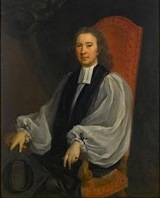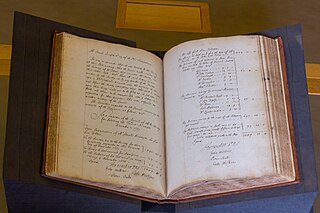Life
He was the son of James (Jacques) Bernard, a Huguenot minister known as a man of letters. He received his education at the University of Leyden, where he took degrees in arts and philosophy. In 1733 he was settled in London, and earning a livelihood by preaching, giving lessons in literature and mathematics, and compiling for the booksellers. [1]
Bernard was admitted a Fellow of the Royal Society in January 1738. He died in the parish of St. Marylebone, on 6 April 1760. [1]

Thomas Birch was an English historian.
George Sale (1697–1736) was a British Orientalist scholar and practising solicitor, best known for his 1734 translation of the Quran into English. In 1748, after having read Sale's translation, Voltaire wrote his own essay "De l'Alcoran et de Mahomet".
Pierre des Maizeaux, also spelled Desmaizeaux, was a French Huguenot writer exiled in London, best known as the translator and biographer of Pierre Bayle.
William Bayle Bernard, often referred to as "Bayle Bernard", was a well-known American-born London playwright and drama critic. Born in Boston, Massachusetts, the son of English comic actor John Bernard, he came to Britain with his family in 1820, where he first worked as a clerk in an army accounts office. His plays include The Four Sisters and Casco Bay (1832), The Kentuckian (1833), The Nervous Man (1833), The Mummy (1833), Marie Ducange (1837), The Round of Wrong (1846), The Doge of Venice (1867), The Passing Cloud (1850) and A Storm in a Teacup (1854), as well as adaptations of Washington Irving's Rip Van Winkle (1834) and Wilkie Collins's No Name (1863). He also wrote the five-volume historical romance The Freebooter's Bride (1829).
The Lady Margaret Professorship of Divinity is a senior professorship in Christ Church of the University of Oxford. The professorship was founded from the benefaction of Lady Margaret Beaufort (1443–1509), mother of Henry VII. Its holders were all priests until 2015, when Carol Harrison, a lay theologian, was appointed to the chair.
John Christmas Beckwith was an English organist and composer.

Richard Willis (1663–1734) was an English bishop.

The Chief Baron of the Irish Exchequer was the Baron (judge) who presided over the Irish Court of Exchequer. This was a mirror of the equivalent court in England, and was one of the four courts which sat in the building in Dublin which is still called The Four Courts.
Montagu Bacon (1688–1749) was an English scholar and critic.

Peter Ball or Balle, M.D., was an English physician.
The General Dictionary, Historical and Critical was a biographical dictionary published from 1734 to 1741 in London in 10 volumes.

Nathaniel Beardmore was a British civil engineer known for his textbook on hydraulic engineering, and his work on water projects associated with the River Lea.

Charles Chauncey (1706–1777) was an English physician, antiquary, and Fellow of the Royal Society.

William Noel was an English barrister, judge and politician who sat in the House of Commons for 35 years from 1722 to 1757.
John Hey (1734–1815) was an English cleric, the first Norrisian Professor of Theology at Cambridge.
Jacques-Georges Chauffepié was an 18th-century French biographer and Calvinist minister and preacher. English, French, and Dutch name authorities identify him as Jacques-George de Chaufepié.

Charles Bernard was an English surgeon, a Fellow of the Royal Society, and master of the Barber Surgeons' Company in 1703.
John Bernard was an English academic and religious author. He is known for a Latin devotional work Oratio Pia that was published some 14 years after his death, and then translated into English.
This page is based on this
Wikipedia article Text is available under the
CC BY-SA 4.0 license; additional terms may apply.
Images, videos and audio are available under their respective licenses.
![]() This article incorporates text from a publication now in the public domain : Stephen, Leslie, ed. (1885). "Bernard, John Peter". Dictionary of National Biography . Vol. 4. London: Smith, Elder & Co.
This article incorporates text from a publication now in the public domain : Stephen, Leslie, ed. (1885). "Bernard, John Peter". Dictionary of National Biography . Vol. 4. London: Smith, Elder & Co.






